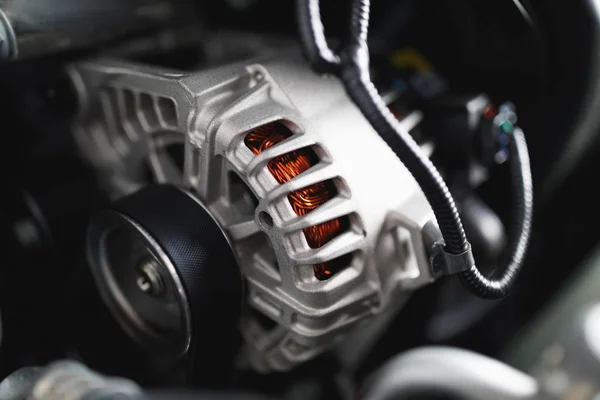Starter motor and alternator
- Feb 16, 2025
- 4 min read

Key Components for Your Vehicle’s Electrical System
Your vehicle’s starter motor and alternator are two crucial components of its electrical system, playing an integral role in ensuring the car starts and runs smoothly. Without them, your car wouldn’t be able to get going, and it wouldn’t run efficiently. Understanding how these systems work, why they’re important, and how to maintain them can help prevent unexpected breakdowns and costly repairs.
What Is a Starter Motor?
The starter motor is the component responsible for starting your engine. When you turn the ignition key (or press the start button), the starter motor is activated, turning the engine’s flywheel and getting the engine moving. Once the engine is running, the starter motor disengages and the engine continues to run on its own power.
Starter motors are electric motors that rely on the battery to function. If there is an issue with the starter motor, it can prevent the engine from starting, leaving you stranded.
Signs You May Have a Starter Motor Issue:
No response when turning the key: If you turn the ignition and hear nothing, or if the engine doesn’t even try to turn over, this could indicate a problem with the starter motor.
Clicking sound: If you hear a clicking noise when you try to start the car, it could mean the starter motor is failing to engage properly.
Grinding noise: A grinding noise when starting the engine can indicate that the starter motor’s gears are worn down or misaligned.
Dashboard lights, but no engine start: If the lights on your dashboard come on but the engine doesn’t start, it could point to a starter motor malfunction or a problem with the battery.
Why Starter Motor Maintenance Is Important:
Reliable starting: A working starter motor is essential to get your engine up and running every time you turn the key.
Prevent breakdowns: Timely starter motor repairs or replacements can help you avoid being stranded when your car fails to start.
Battery health: Since the starter motor uses a lot of power from the battery, keeping it in good condition ensures that your battery isn’t drained unnecessarily.
What Is an Alternator?
The alternator is responsible for keeping your car’s battery charged and powering the electrical systems while the engine is running. The alternator takes over the job of generating electricity once the engine starts, supplying power to the vehicle’s lights, radio, air conditioning, and other essential systems.
As your engine runs, the alternator uses a belt and pulley system to convert mechanical energy into electrical energy. This electrical energy recharges the battery, ensuring it has enough power to start the car next time and operate electrical features.
Signs You May Have an Alternator Problem:
Dim or flickering lights: If your headlights or dashboard lights start to dim or flicker, it could mean that the alternator isn’t providing enough power.
Warning light: If the battery warning light appears on your dashboard, it could indicate an alternator issue.
Electrical issues: Unexplained electrical malfunctions, like the radio turning on and off or power windows not working properly, can indicate that the alternator is failing.
Dead battery: A failing alternator may not recharge the battery properly, leading to a dead battery and a car that won’t start.
Strange noises: If you hear grinding or whining noises coming from the engine area, it could indicate that the alternator’s bearings are worn out.
Why Alternator Maintenance Is Important:
Battery charging: A working alternator ensures that your battery stays charged, which is essential for starting the car and powering electrical systems.
Smooth driving: When the alternator is functioning properly, you won’t experience power dips or sudden electrical issues that could interfere with your driving experience.
Prevent battery failure: A faulty alternator can lead to a dead battery, which could leave you stranded and in need of a jump start or replacement.
Starter Motor and Alternator Maintenance
Both the starter motor and alternator are essential to your vehicle’s electrical system, and it’s important to maintain them regularly to avoid costly failures. Here’s how you can help keep these components in top shape:
For the Starter Motor:
Regularly check your battery’s health and connections, as a weak battery can put extra strain on the starter motor.
Listen for any unusual sounds when starting your car, such as grinding or clicking, and address them early.
If you experience problems starting your vehicle, have the starter motor inspected promptly to avoid getting stranded.
For the Alternator:
Have your alternator inspected during regular service appointments to ensure it's charging your battery properly.
If you notice dimming lights or other electrical issues, check the alternator as soon as possible.
Keep an eye on the health of your battery, as a dead battery may be a symptom of a faulty alternator rather than a problem with the battery itself.
Book Your Starter Motor and Alternator Check Today
If you’re experiencing trouble starting your vehicle or noticing electrical issues, don’t wait for them to get worse. Book an inspection with Woodland Auto today. Our experienced technicians will diagnose any issues with your starter motor or alternator and ensure your vehicle is ready to go when you are.






Comments